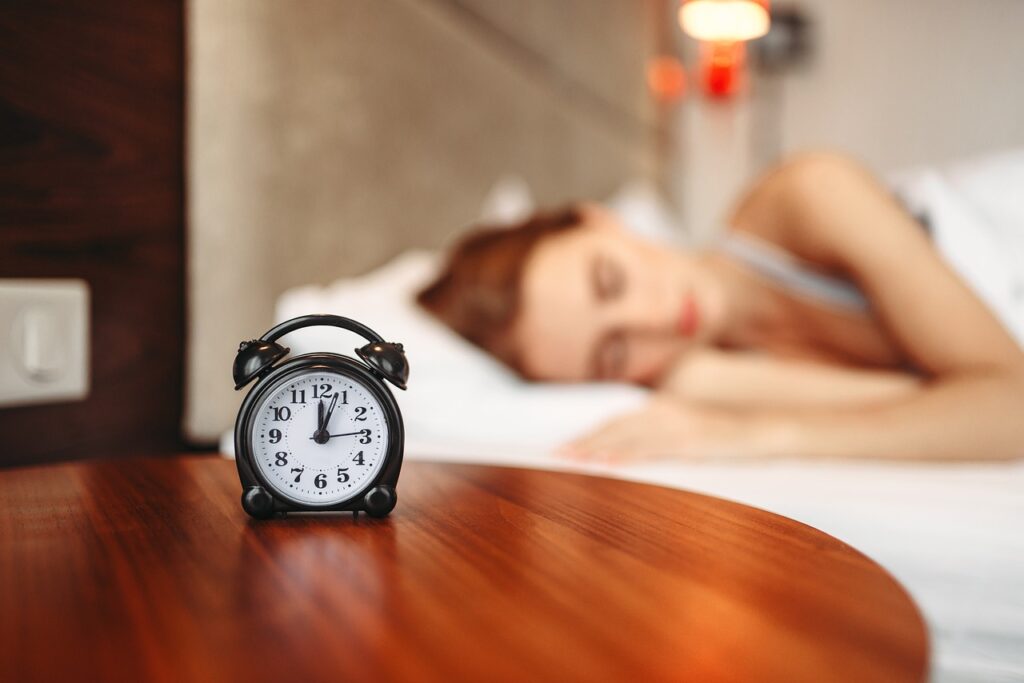


Adjusting to a new sleep schedule can feel like an uphill battle — whether you travel across time zones, want to improve your sleep hygiene and start waking up earlier, or prepare yourself for shift work. How long does it take to adjust to a new sleep schedule?
Establishing how long it will take you to adjust to a new schedule is tricky. It won’t happen overnight, but the precise estimate depends on multiple factors.
In this article, we’ll explore the factors that influence the adjustment period, provide practical strategies and tips, and examine the importance of sufficient sleep.
The period of adapting to new sleep and wake times varies for every individual. This process is influenced by several factors, making it a personal journey that hinges on your body’s internal clock.
This internal clock, also known as your circadian rhythm, is influenced by a handful of elements. They include personal motivations, sleep debt, your chronotype, and the amount of sleep you require.
Wondering how long it takes to reset your body clock and get used to a new wake-up time? The answer isn’t exactly straightforward.
Several factors, unique to each person, come into play. Besides the aspects listed above, your age, general health, and habits also play a significant role.
According to many sleep experts, the typical guideline is approximately a day for every hour your sleep schedule is adjusted. For instance, if you move your bedtime two hours earlier, you may need two days to fully adjust.
Nevertheless, this estimate is just an average, and individual experiences may differ.
Scientific sleep research suggests that light exposure plays a significant role in influencing our internal body clock. Therefore, using this natural cue can help speed up the adjustment process.
Going outside during daylight hours or using special light therapy devices can support you in resetting your sleep schedule.
On top of that, consistency is key. Establishing a regular bedtime and wake-up time will help reset your body’s internal clock.
So, while it might take some time to adjust to a new sleep pattern, there are methods available to help speed up the process.

Photo by Elena Koycheva on Unsplash
A regular sleep schedule not only keeps your body’s internal clock in check but also fosters good quality sleep.
What exactly is a sleep schedule? It’s a defined routine of hitting the sack and waking up at the same time every day. This reliable routine is the cornerstone of a healthy sleep pattern and allows for necessary adjustments to your sleep.
A sleep schedule is vital in aligning your body’s circadian rhythm with the day-night cycle. This rhythm manages various bodily processes, from sleep-wake cycles to hormone production and metabolism.
When you sleep and wake up consistently, your body learns the drill. It knows when it’s time to rest and when to wake up, leading to improved sleep quality.
Let’s break it down with a simple table showing the perks of having a sleep schedule:
| Benefits of Having a Sleep Schedule |
| – Regulates the body’s internal clock – Promotes consistent sleep patterns – Enhances overall sleep quality – Supports optimal mental and physical health |
So, how does a sleep schedule work?
By sticking to a sleep schedule, you’re training your body to follow a specific routine. It becomes easier to fall asleep and wake up when you want to. This regularity helps control the timing and length of your sleep, leading to better sleep quality and more alertness during the day.
If you’re a frequent flyer or shift worker, sticking to a sleep schedule can help reduce the impact of jet lag and sleep disruption.

Source: https://pixabay.com/pl/photos/budzik-łóżko-spać-sypialnia-zegar-4568283/
Getting comfortable with a new schedule when you go to sleep and wake up is all about making gradual adjustments to your daily routine.
In other words, establishing a healthy sleep pattern requires patience and consistency.
For best results, try to align your schedule as closely as possible with day and night.
Creating an optimal sleep environment and understanding your personal motivations for change can greatly contribute to a successful transition.
Here are some steps you can take to combat sleep deprivation and improve your sleep health.
Gradual adjustments are an effective way to reset your sleep routine without diminishing the quality of your sleep.
Rather than abruptly changing your sleep pattern, you can ease your body into it. It’s a process that avoids shocking your system, making the transition seamless.
For example, you can tweak your bedtime and wake-up time by just 15 minutes each day.
This minor shift makes a big difference. It allows your body to slowly acclimatize to the new schedule without causing a major disruption to your routine.
Besides, consider using melatonin supplements. Melatonin is a hormone that plays a crucial role in controlling sleep-wake cycles.
Introducing melatonin supplements to your routine can help fine-tune your circadian rhythm and sleep cycle, facilitating a smoother adjustment to a new sleep schedule.
Your body operates on an internal clock, also known as the circadian rhythm. This rhythm is what tells your body when it’s time to sleep and when it’s time to wake up. A regular sleep routine keeps this rhythm balanced.
It’s all about setting a steady pattern. Going to bed and waking up at the same time every day creates a predictable cycle. Think of it as setting an alarm clock for your body.
The most important piece of advice is to hit the sheets and rise at the same time every day, regardless of whether it’s a weekday or weekend. When your body knows what to expect, it can adjust accordingly.
What happens without consistency?
Well, your body might struggle — it may have a hard time adjusting to the changes in your sleep schedule.
This situation can lead to problems, like difficulty falling asleep or staying asleep and other sleep disorders.
The significance of a tranquil sleep environment is often underestimated. Yet, creating a serene space conducive to rest is essential to signal your body it’s time to go to bed.
Reducing distractions and engaging in relaxing activities prior to bedtime can help you sleep better.
The critical elements of an optimal sleep environment are darkness and silence.
Our personalized sleep app is also an excellent choice. It can help you track your sleep phases and provides a wide array of soothing sounds that promote sleep.
The temperature of your bedroom is another crucial aspect to consider. A cool, well-ventilated room is ideal for restful, healthier sleep. Ensure your bedroom is cool enough to be comfortable yet warm enough not to cause any discomfort.
Electronic devices are known sleep disrupters. The blue light they emit interferes with our sleep schedule.
Therefore, it’s also best to limit your screen time late in the day and avoid using devices like smartphones or tablets before bed.
Understanding why you are gearing up for a change in your sleep routine can help you push through the initial difficulties.
It’s not always easy to adjust your sleeping habits, but your personal motivations can fuel your commitment and keep you on track.
These motivations are unique to you. They form the foundation of your goals and strategies to reset your circadian rhythm, helping you overcome any sleep issues you might be grappling with.
Let’s break down some common reasons for wanting to switch up sleep schedules, along with some handy transition tips:
| Personal Motivation | Tips for a Smooth Transition |
| Improved productivity | Stick to a set sleep routine. Avoid screens before you go to bed. |
| Better physical health | Regular exercise and a balanced diet are key. Make sleep a priority and create a sleep-friendly environment. |
| Enhanced mental well-being | Try relaxation techniques like meditation or deep breathing before sleep. |
Understanding your motivations and applying these tips are the first steps toward a successful change in your sleep schedule. Embrace the benefits of a healthy sleep routine.
Yes, you’ll need patience and dedication, but the payoff will be worth it.
Adjusting to a new sleep schedule is almost always challenging. Whether you’re dealing with a condition like delayed sleep phase syndrome or sleep apnea or simply want to change the hour you go to bed, your body will need time to adapt.
How long the process will take can vary depending on individual factors like your sleep debt, chronotype, and personal motivation.
However, on average, it takes about one to two weeks to adapt to a new sleep routine.
A consistent sleep schedule will provide optimal rest and improve your overall well-being.
Follow the tips for resetting your sleep schedule provided above, and you’ll unlock the benefits of a well-rested life. Good luck!
Blume, C., Garbazza, C., & Spitschan, M. (2019). Effects of light on human circadian rhythms, sleep and mood. Somnologie : Schlafforschung und Schlafmedizin = Somnology : sleep research and sleep medicine, 23(3), 147–156. https://doi.org/10.1007/s11818-019-00215-x